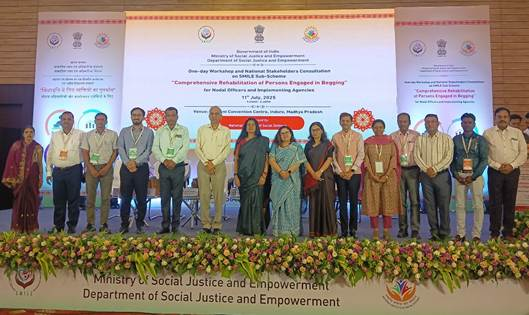Indore Hosts National Workshop on SMILE-B Scheme for Beggar Rehabilitation
The scheme is being implemented across 100 cities in 34 States/UTs under Phase 3, with over 22,410 individuals identified and 3,400 successfully rehabilitated to date.

- Country:
- India
In a powerful step towards building a Bhiksha Vritti Mukt Bharat (Begging-Free India), the Union Ministry of Social Justice and Empowerment (MoSJE) convened a National Workshop and Orientation Programme in Indore to accelerate the implementation of the SMILE Sub-Scheme for Comprehensive Rehabilitation of Persons Engaged in the Act of Begging (SMILE-B). The day-long event held on July 11, 2025, brought together over 150 stakeholders from across the country including State Nodal Officers, Urban Local Bodies (ULBs), Non-Governmental Organizations, and members of the Expert Network.
The workshop was presided over by Secretary, Department of Social Justice and Empowerment, Shri Amit Yadav, who delivered the keynote address, laying out the government’s vision for a unified, data-driven, and humane strategy to uplift and empower some of India’s most vulnerable individuals.
SMILE-B: A Framework for Inclusive Rehabilitation
The SMILE Scheme (Support for Marginalized Individuals for Livelihood and Enterprise), launched in October 2023, represents a landmark national initiative aimed at addressing the issue of begging in India through systemic and sustainable means. Its SMILE-B component is specifically focused on the rescue, rehabilitation, skill development, and reintegration of individuals engaged in begging.
The scheme is being implemented across 100 cities in 34 States/UTs under Phase 3, with over 22,410 individuals identified and 3,400 successfully rehabilitated to date.
Highlights from the National Workshop
The workshop in Indore was structured to blend technical discussions, stakeholder consultations, and experience sharing, making it a holistic platform for assessing ground realities and scaling best practices.
Technical Sessions:
-
A presentation by the National Skill Development Corporation (NSDC) showcased pathways to skilling and employment for rehabilitated individuals.
-
Experts from National Institute of Social Defence (NISD) led sessions on psychological counseling and rehabilitation planning.
-
Real-life success stories from beneficiaries who transitioned from begging to stable livelihoods inspired attendees with stories of resilience.
-
Panel discussion with nodal officers from six States offered practical insights from field-level implementation, addressing key challenges and innovations.
SOP Training and Best Practices:
Ministry officials conducted detailed training sessions on Standard Operating Procedures (SOPs), including field protocols for rescue operations, shelter home management, health and vocational assessments, and post-rehabilitation tracking.
Stakeholder Consultation: Planning Beyond FY 2025–26
A significant part of the day was dedicated to a high-level stakeholder consultation led by Additional Secretary, D/o SJE, Ms. Caralyn K. Deshmukh, where revised SMILE-B guidelines, cost norms, and expansion strategies were debated. The discussion focused on extending the scheme beyond its current funding timeline of FY 2025–26, ensuring continuity and impact at scale.
Stakeholders emphasized the following needs:
-
Increased interdepartmental collaboration, especially with health, housing, and skill development departments.
-
Greater financial autonomy for implementing agencies to adapt localized strategies.
-
Improved data tracking and impact assessment mechanisms using technology tools.
Voices from the Ground
Shri Amit Yadav, in his keynote, reinforced the Ministry’s commitment to inclusive and dignified rehabilitation:
“We must work in unison to ensure that no citizen is left behind. Our approach must blend compassion with capacity building and rigorous monitoring.”
Ms. Sonali Ponkshe Vayangankar, Principal Secretary, Social Justice Department, Government of Madhya Pradesh, praised the central government’s support and emphasized interdepartmental coordination as key to the scheme’s success in states like MP.
Ms. Caralyn K. Deshmukh reaffirmed the government's vision of inclusive support and urged stakeholders to treat rehabilitated individuals as change agents, not just beneficiaries.
A Marketplace of Dignity: Showcasing Beneficiary Merchandise
A noteworthy addition to the workshop was a live exhibition of products made by rehabilitated persons, reviewed personally by Secretary Shri Amit Yadav. Items ranged from handicrafts and textiles to eco-friendly home goods, offering a glimpse into how economic rehabilitation is being translated into real-world entrepreneurship.
This initiative demonstrated how livelihood convergence with skill development and social reintegration can create sustainable change for individuals once relegated to the margins of society.
A National Movement Towards Dignity and Inclusion
With representation from 23 States/UTs and 67 Districts, the workshop was not just an administrative event but a symbol of the growing national momentum behind the SMILE-B scheme. It reinforced that begging is not a crime, but a condition born out of systemic deprivation, and that India is now committed to addressing it through structured, respectful, and rights-based rehabilitation.
As the Ministry gears up for the next phase, the outcomes of this national workshop will serve as a guiding framework for scaling efforts, deepening impact, and fostering a society where every individual has access to dignity, livelihood, and opportunity.
- READ MORE ON:
- SMILE Scheme
- SMILE-B
- Begging-Free India
- MoSJE
- Social Justice
- Rehabilitation
- Indore Workshop
- Amit Yadav
- Inclusive Development
- Urban Livelihoods
- NSDC
- NISD
- NGO Participation
- Skill Development
- Bhiksha Vritti Mukt Bharat
- Homeless Support
- Dignity Restoration
- India Welfare Schemes
- Social Empowerment
ALSO READ
Chhattisgarh's Path to Peace: Transforming Surrendered Naxals Through Skill Development
Tamil Nadu Expands Women-Centric and Skill Development Schemes
Chhattisgarh Intensifies Efforts to Eradicate Naxalism, Focuses on Rehabilitation and Skill Development
Aadhaar Mandate for Disabled Skill Development Scheme
Empowering Karnataka's Youth: A Model for Skill Development










